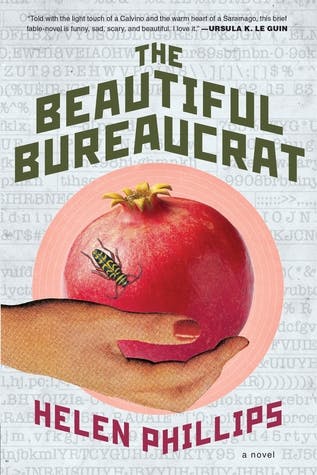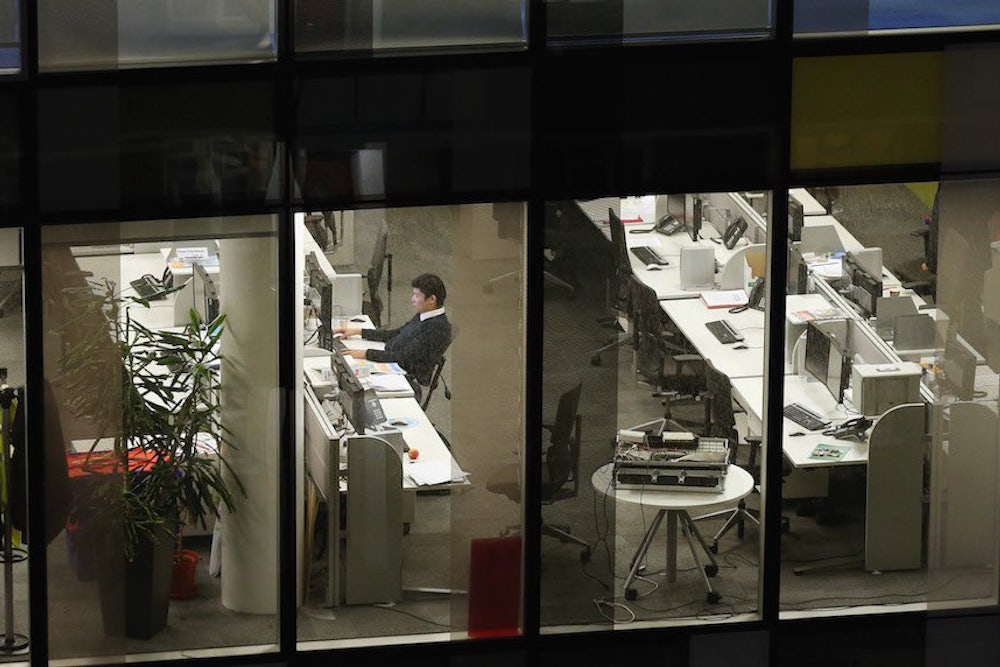Office literature has a long legacy, from Herman Melville’s Bartleby, the Scrivener to Sinclair Lewis’s The Job to Lydie Salvayre’s Everyday Life and Ed Park’s Personal Days. Most narratives in this genre find momentum and texture in human drama: the latent rivalries and affections, open secrets and personal politics, and dueling motivations bound to emerge in any contrived social space. In Helen Phillips’s debut novel, The Beautiful Bureaucrat, the drama isn’t interpersonal—it’s driven by the enigmatic nature of work itself. Equal parts mystery, thriller, and existential inquiry, Phillips’s book evokes the menace of the mundane.
Josephine Newbury, the novel’s protagonist, is a young newlywed who moves to an unnamed city with her husband and badly needs a job. She finds one at an ambiguously named corporation (A-Z or Z-A, depending on one’s perspective), a windowless monolith with endless corridors and an unspeakable mission. Josephine’s sole task is to enter strings of letters and numbers, drawn from paper files labeled with strangers’ names, into a computer program known only as the Database. Josephine does not know what the Database is for, nor does she know the nature of the data for which she is a conduit. But a job is a job: “Hourly rate $XX.XX (not so very much, but so very much more than nothing), benefits, tax paperwork, the stuff of life.” It’s a prescient observation: as Josephine eventually learns, paperwork is not just the stuff of life, but life itself.

The Beautiful Bureaucrat walks a thin line between the real and the surreal. Technology is ostensibly central to the plot, but where techno-thrillers and science fiction have deployed technology to explore the limits of society and humanity, the tech in this novel is deceptively benign in its simplicity: it’s just a terminal. Similarly, though the building scans as an M.C. Escher of poorly lit hallways and infinite internal staircases, it can also be read as poor corporate design, of the sort easily found in urban centers. Outside, the unnamed city is reliably familiar in its non-specificity. This is no vibrant dystopia; it’s more or less the world as we know it.
Inside the office, even the eeriest occurrences have a logic to them, and are tenable with a bit of willful self-deception. Over time, Josephine’s eyes grow bloodshot and her skin breaks out; the walls of her office appear to be closing in. She notices “scratches, smears, shadowy fingerprints, the echoes of hands” above her desk. This perspective occupies the gray area between reality and confirmation bias. Just as bloodshot eyes can be easily explained away—isn’t it the prerogative of eyes to protest a life spent staring at a screen?—so too can the claustrophobia Josephine experiences in her tiny office, toiling away at a job that means nothing to her. The lightly surreal is juxtaposed with lines like: “She spent the rest of the workday blasting through files, devoid of curiosity, dying to get the hell home and just be a person with Joseph”—a tender sentiment that could happily belong to any number of stories about a young couple moving through life’s tedium.
For sixteen months in my mid-twenties, I worked for a data-analytics startup in San Francisco. The software that we sold enabled people to collect customized data on user behavior; be it a game or a dating website, any interaction or smudge of inputted information could be captured, stored and queried. My job involved helping people use the software, and helping companies decide what data to collect: effectively, how to conceptualize, and populate, a database. A few months after I started, Edward Snowden leaked classified information from the National Security Agency, exposing not only secret government surveillance programs, but the depth and reach of the databases they created. I was so focused on my work and its immediate applications—benign and useful things like A/B testing and cohort-specific email campaigns—that I failed to connect the dots between the industry I worked in and the headlines. My job was my job; it was mundane, and anyway, software like this is ubiquitous: you would be hard-pressed to find a company that didn’t collect and analyze user data. Still, I didn’t see the way in which my work might have been contributing to the normalization of private databases on user—human—information; this sort of technology rushes forward, faster than we can gauge its long-term cultural impact.
That the Database—any database at all, really—stands at the center of The Beautiful Bureaucrat is particularly timely, as our society comes to understand the implications of its own technologies: the threat of totalitarianism, the surrender of privacy, the potential loss of individual agency. Phillips’s 2011 short-story collection, And Yet They Were Happy, is thread through with apocalyptic themes, as if holding up a bent mirror to the world that we live in. Similarly, The Beautiful Bureaucrat intentionally or not taps into contemporary anxieties around Big Data: how (and why, and by whom) the minutia of our lives is captured, and to what ends.
Phillips’s novel shows Josephine’s attempts to reclaim agency and individuality in the face of stultifying labor and the reduction of life into paperwork. The generic qualities of the novel’s physical world stand in direct contrast to Josephine’s vivid internal life, and the world she creates and inhabits with her husband Joseph. Within the boundaries of her physical self, her experience is visceral and reactive: she sees herself as animal, beast. She and Joseph have fled their hometown in pursuit of a fuller life, and refer back to it only as the “Hinterland, hint of land… that endless suburban non-ness.” This wordplay is present throughout the book, a shared language between the two. It originates as an endearing trait of Joseph’s: words roll over into other words. (“Put on something festive,” he tells Josephine, “Suggestive. Progressive.”) Gradually, this wordplay becomes an ominous internal tic for Josephine, as if an infection of language. Words begin to divide and fall apart.
In turn, with each increasingly pernicious apartment, Josephine’s marriage slowly breaks down. When Joseph disappears overnight, the problem itself is so commonplace, so ordinary—as if torn from another narrative, a cliché—that Josephine cannot report him gone: “She considered calling the police. She imagined them laughing at her. A husband a few hours late getting home. Sorry, baby, you’re not the first.” The unhappiness of unsatisfying work; a husband who blames his absence on a late night at the office; the transience of moving to a new city on a shoestring budget: these narratives have the edifice of normalcy, and every deviation, each twitch of the formula, belies a far darker universe.
Josephine’s work steadily chips away at her identity: it is a trudge against time, and its tedium subsumes her. Even when her mind meanders, “the moment would pass and the thought would be lost, trapped forever between the horizontal and vertical lines of the Database.” It is difficult not to place Josephine in the long lineage of women slotted into such dulling roles—typing, stenography—since a critical mass entered the white-collar workplace in the early twentieth century. As Nikil Saval notes in Cubed: A Secret History of the Workplace, “the workers themselves were often referred to simply as ‘type-girls’; sometimes, dispensing with the need to distinguish humans from machines, women were just called ‘typewriters.’” And so with Josephine: “She didn’t need to understand her job; she just needed to keep it.” She is hardly the first to discover that work can encroach upon one’s sense of self.
The Beautiful Bureaucrat asks uneasy questions about work and life, love and power, and where the whole enterprise of one’s own small life is swiftly headed. At the end of the novel, clerical errors force Josephine to confront two incompatible versions of her own future, each one uniquely devastating. The stakes are high, the losses significant. Then, as quickly and clinically as Josephine’s future is split, her fate is decided. Of course, as in any bureaucracy, the decision is—and was—never Josephine’s to make.
